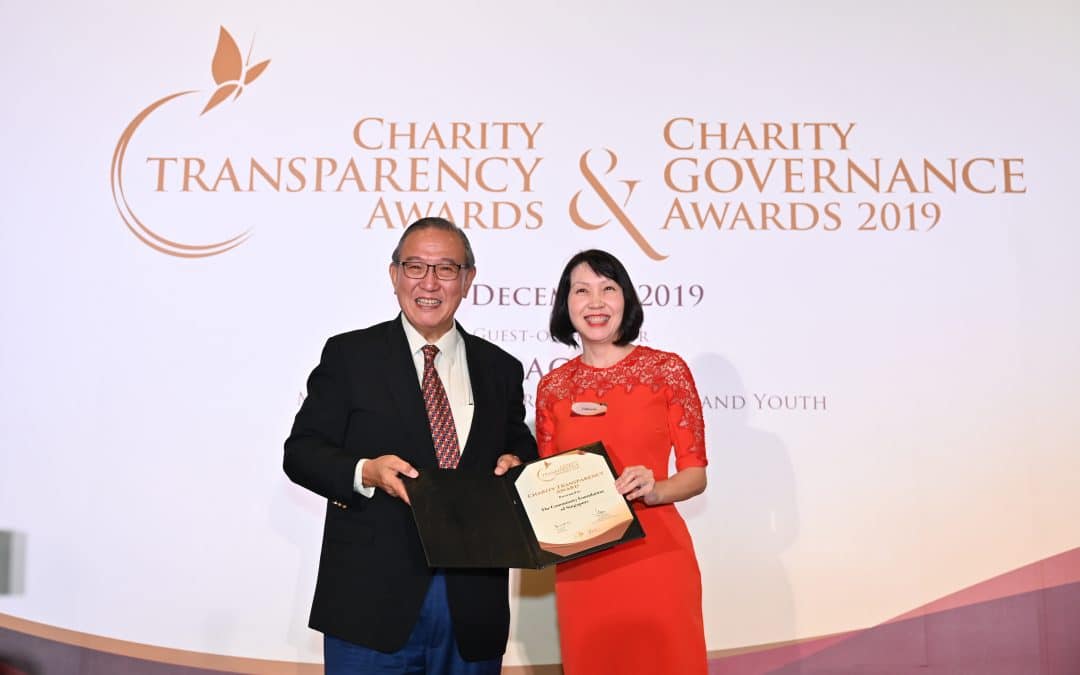Governance is a continuous journey for charities


By Trillion So
EARLIER this month I attended the Charity Transparency and Governance Award dinner organised by the Charity Council. It was a proud moment for the charities that received the Charities Transparency Awards (CTA) 2019, which ranged from small, medium to large, all 67 of them.
I sit on the board of Community Foundation Singapore (CFS) and chair its Audit and Risk Committee (ARC). CFS received the CTA for the Large Category and Special Commendation Award (SCA) 2019 for Governance and Management.
As the ARC chair of CFS, I felt a sense of achievement; at the same time recognising that this could only be done with the focus and team work between management, staff, board and board committee members. As a winner in the Large Category, CFS was up against many worthy, well-established organisations with a bigger staff strength. This shows that good governance, transparency and management, can be achieved by everyone, as long as the right ingredients are present.
There is no one magic ingredient. Some key considerations are:
Consider the size, age, purpose, funding model and future growth plans of the organisation first;
Which aspects of good governance are critical now, and which will become important in three years’ time?
Identify skills, resources and people needed to effectively implement new or changed governance and management processes/systems; and
Plan and coordinate any changes within appropriate timeframes – a practical timetable for phasing in new practices is better than hasty reaction
Corporate governance is a journey towards building trust and confidence with key stakeholders, alongside having a mindset of acting with integrity. The beauty of a journey is that you never stand still. You will strive for continuous improvement and enhancement. Improved governance will result in improved public image and transparency, which then motivates the community to give more time and money, and ultimately increase the benefits of the beneficiaries.
Reflecting on CFS’s journey, the board members are of diverse backgrounds and set the right tone from the top. Management takes all recommendations from internal auditors and the Ministry of Culture, Community and Youth (MCCY) very seriously.
I recall one of the reviews by MCCY a while back revealed that CFS did not have an Enterprise Risk Management (ERM) framework. Management immediately embarked on a project assisted by an external consultant to adopt ERM.
With the ERM, it is very clear which are the top risks, what can be done to mitigate the risks and whether any new risks have emerged so that actions can be taken to reduce the risks. It was not a one-off effort, but a continuous and purposeful deployment of ERM, up to today, which yielded results. The Audit Committee then transformed into the ARC from that point onwards, to ensure there is focus on both audit and risks. This is just one example of the continuous enhancement culture that is important for good corporate governance.
What’s next for the charities after receiving the CTA 2019? How do they continue on this corporate governance journey? What should they do differently?
One area that will disrupt business as usual for charities is: new technologies and the digital economy. Charities are starting to use Blockchain technology to ensure donors’ monies are spent on the right programmes and right recipients, including visibility and impact monitoring. Board members of charities need to think about their digital strategy and the risks involved in going digital.
CYBER RISK
Cyber risk is very real and can destroy the reputation of a charity and negate the good work it is doing, bringing it to a standstill if not properly managed. As an audit partner, I have noticed that cyber risk is fast becoming the top risk in most organisations. The Code of Governance issued by the Charity Council requires charities to build up their image to be consistent with its objectives and so charities will have to think of performing vulnerability assessments and penetration tests where applicable.
If charities tap on this area, they will increase productivity and enhance governance. Charities can harness the power of data analytics to perform continuous monitoring, gain insights and highlight areas to investigate. For example, in the area of procurement and payments, insights such as duplicate payments, split payments, early or late payments, and similar bank accounts between vendor and staff, will be red flags worth following up. The beauty of data analytics is that it combs through 100 per cent of the data and can be done continuously. Once set up, it can improve efficiency and effectiveness of internal controls, and is a great tool of oversight.
However, most charities would not have the expertise to start a data analytics programme and it may be costly too. I echo what Grace Fu, Minister for Culture, Community and Youth, said in her speech at the Charity Transparency and Governance Awards. She mentioned that charities and the community should collaborate to serve Singaporeans better, and to engage new partners and harness community resources.
There is a call, therefore, for people with technology, digital, data analytics and cybersecurity skillsets to step up and volunteer in the charities sector to help make a difference. Perhaps the CSR programmes of corporates should include placing their people with such expertise to sit in charity boards or committees, as well as collaborate in the partnership with charities and government.
I also hope that the recipients of the CTA Awards pay it forward by mentoring other charities in the corporate governance space, and for larger charities to play a bigger role in the charities sector, especially in the technology and digital space to enhance the corporate governance more efficiently and effectively.
The writer is partner at PwC Singapore and board member of Community Foundation of Singapore, where she also chairs its Audit and Risk Committee
Source: Business Times © Singapore Press Holdings Limited
By Trillion So
EARLIER this month I attended the Charity Transparency and Governance Award dinner organised by the Charity Council. It was a proud moment for the charities that received the Charities Transparency Awards (CTA) 2019, which ranged from small, medium to large, all 67 of them.
I sit on the board of Community Foundation Singapore (CFS) and chair its Audit and Risk Committee (ARC). CFS received the CTA for the Large Category and Special Commendation Award (SCA) 2019 for Governance and Management.
As the ARC chair of CFS, I felt a sense of achievement; at the same time recognising that this could only be done with the focus and team work between management, staff, board and board committee members. As a winner in the Large Category, CFS was up against many worthy, well-established organisations with a bigger staff strength. This shows that good governance, transparency and management, can be achieved by everyone, as long as the right ingredients are present.
There is no one magic ingredient. Some key considerations are:
Consider the size, age, purpose, funding model and future growth plans of the organisation first;
Which aspects of good governance are critical now, and which will become important in three years’ time?
Identify skills, resources and people needed to effectively implement new or changed governance and management processes/systems; and
Plan and coordinate any changes within appropriate timeframes – a practical timetable for phasing in new practices is better than hasty reaction
Corporate governance is a journey towards building trust and confidence with key stakeholders, alongside having a mindset of acting with integrity. The beauty of a journey is that you never stand still. You will strive for continuous improvement and enhancement. Improved governance will result in improved public image and transparency, which then motivates the community to give more time and money, and ultimately increase the benefits of the beneficiaries.
Reflecting on CFS’s journey, the board members are of diverse backgrounds and set the right tone from the top. Management takes all recommendations from internal auditors and the Ministry of Culture, Community and Youth (MCCY) very seriously.
I recall one of the reviews by MCCY a while back revealed that CFS did not have an Enterprise Risk Management (ERM) framework. Management immediately embarked on a project assisted by an external consultant to adopt ERM.
With the ERM, it is very clear which are the top risks, what can be done to mitigate the risks and whether any new risks have emerged so that actions can be taken to reduce the risks. It was not a one-off effort, but a continuous and purposeful deployment of ERM, up to today, which yielded results. The Audit Committee then transformed into the ARC from that point onwards, to ensure there is focus on both audit and risks. This is just one example of the continuous enhancement culture that is important for good corporate governance.
What’s next for the charities after receiving the CTA 2019? How do they continue on this corporate governance journey? What should they do differently?
One area that will disrupt business as usual for charities is: new technologies and the digital economy. Charities are starting to use Blockchain technology to ensure donors’ monies are spent on the right programmes and right recipients, including visibility and impact monitoring. Board members of charities need to think about their digital strategy and the risks involved in going digital.
CYBER RISK
Cyber risk is very real and can destroy the reputation of a charity and negate the good work it is doing, bringing it to a standstill if not properly managed. As an audit partner, I have noticed that cyber risk is fast becoming the top risk in most organisations. The Code of Governance issued by the Charity Council requires charities to build up their image to be consistent with its objectives and so charities will have to think of performing vulnerability assessments and penetration tests where applicable.
If charities tap on this area, they will increase productivity and enhance governance. Charities can harness the power of data analytics to perform continuous monitoring, gain insights and highlight areas to investigate. For example, in the area of procurement and payments, insights such as duplicate payments, split payments, early or late payments, and similar bank accounts between vendor and staff, will be red flags worth following up. The beauty of data analytics is that it combs through 100 per cent of the data and can be done continuously. Once set up, it can improve efficiency and effectiveness of internal controls, and is a great tool of oversight.
However, most charities would not have the expertise to start a data analytics programme and it may be costly too. I echo what Grace Fu, Minister for Culture, Community and Youth, said in her speech at the Charity Transparency and Governance Awards. She mentioned that charities and the community should collaborate to serve Singaporeans better, and to engage new partners and harness community resources.
There is a call, therefore, for people with technology, digital, data analytics and cybersecurity skillsets to step up and volunteer in the charities sector to help make a difference. Perhaps the CSR programmes of corporates should include placing their people with such expertise to sit in charity boards or committees, as well as collaborate in the partnership with charities and government.
I also hope that the recipients of the CTA Awards pay it forward by mentoring other charities in the corporate governance space, and for larger charities to play a bigger role in the charities sector, especially in the technology and digital space to enhance the corporate governance more efficiently and effectively.
The writer is partner at PwC Singapore and board member of Community Foundation of Singapore, where she also chairs its Audit and Risk Committee
Source: Business Times © Singapore Press Holdings Limited
- Related Topics For You: CHARITY STORIES, DONOR STORIES, EVENTS, OPINION



